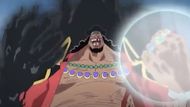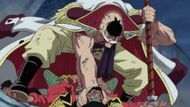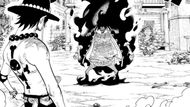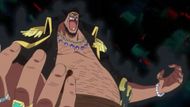One Piece has always been more than a tale of pirates chasing treasure. It’s a story about dreams, choices, and the consequences of pursuing freedom in a cruel world. Few characters embody this complexity more than Marshall D. Teach, better known as Blackbeard.
With the recent revelations about his childhood and connections to Rocks D. Xebec, fans are debating whether his tragic upbringing excuses his vile actions. On the surface, Teach’s past, being born in God Valley, losing his parents, growing up as an orphan, and suffering injustice, seems like the kind of origin story that would normally earn audience sympathy.
Yet, Eiichiro Oda isn’t trying to make us forgive Blackbeard. If anything, his backstory explains him without redeeming him. Blackbeard chose betrayal, exploitation, and the pursuit of power at any cost. That is the crucial distinction, and it’s Oda’s point.

Marshall D. Teach in One Piece was born 40 years ago in Shade Port to Rocks D. Xebec and an unknown woman. Xebec, the most feared and strongest pirate of his era, had sent his wife and child to God Valley for protection. Fate, however, had other plans.
The World Nobles used God Valley as the stage for their “Native Hunting Competition,” a barbaric bloodsport where entire communities were treated as prey. Teach, his mother, and the Davy family were captured and hunted as “Super Rare Rabbits.” His mother perished, and he was left by himself.
The boy survived, scarred by trauma and loneliness. His fascination with the Yami Yami no Mi, an ability that literally devours light and nullifies powers, became his obsession. For Teach, darkness wasn’t just a fruit power; it became the metaphor for his worldview: survival through devouring others, no matter the cost.
This is where some fans feel sympathy. After all, isn’t Teach just a broken child abandoned by the world? But here’s the flaw in that argument: One Piece is full of broken children.
Nico Robin lost her family and home to the Buster Call. Law watched his nation burn from Amber Lead Syndrome. Kuma endured slavery and experimentation. Oda deliberately parallels Teach’s past with other tragic stories to remind us that suffering explains actions, but it doesn’t excuse them.
Life with Whitebeard: A mask of loyalty

At age 12, Teach begged Whitebeard to let him join his crew. Whitebeard, a father figure to countless orphans, took him in. But Teach wasn’t there for family or loyalty; he was playing the long game. He knew that staying under Whitebeard increased his odds of finding the Yami Yami no Mi.
For nearly 26 years, he hid in plain sight. He fought alongside Whitebeard’s sons, laughed with them, and even encouraged Ace to take the position of division commander while claiming he had no ambition himself. That humble mask concealed his burning desire for power.
When Thatch found the Yami Yami no Mi, Teach killed him without hesitation. This wasn’t a desperate act of survival. It was cold-blooded, premeditated betrayal. Oda crafted this moment carefully: the man who was raised as a son murdered his own “brother” for a chance at power.
The capture of Ace: Ambition over family

Teach’s betrayal didn’t stop with Thatch. When Ace pursued him for revenge, Teach defeated and captured him, handing him over to the Marines. Many fans excuse this as a tactical move or even an act of “revenge against Roger” through his son. But this interpretation is revisionist. Blackbeard himself admitted it: he wanted recognition, power, and a place among the Warlords. Ace was simply a bargaining chip.
His execution sparked the Paramount War, where Whitebeard died, the world order shifted, and Teach claimed the Gura Gura no Mi for himself. This moment crystallizes Teach’s character. He wasn’t avenging a clan. He wasn’t standing up against injustice. He was opportunistically dismantling the family that raised him.
Compare this to Luffy, who stormed Impel Down and Marineford to save his brother, risking everything. The contrast is deliberate. Teach treats people as stepping stones. Oda makes it clear: tragedy shaped him, but selfish ambition defines him.
The devil in Impel Down and Marineford

If there was any doubt about Teach’s moral compass, his actions in Impel Down and Marineford sealed it. At Impel Down, he unleashed chaos not to liberate the oppressed, but to recruit the most dangerous killers from Level 6.
He forced them into gladiatorial deathmatches, selecting only those ruthless enough to survive. Unlike Luffy, who sought allies in desperate prisoners like Bon Clay, Teach sought only tools to further his ambitions.
At Marineford, he and his crew gunned down Whitebeard in his dying moments. He didn’t just kill his former captain; he desecrated his body to steal the Gura Gura no Mi. His declaration, “This is my era!” wasn’t about freedom. It was about domination.
The philosophical clash: Blackbeard vs. Luffy in One Piece

Blackbeard’s existence is Oda’s way of testing the central theme of One Piece: what does it mean to chase dreams and freedom?
- Luffy’s Freedom: Luffy seeks the freedom to live, laugh, and protect his friends. His dream uplifts those around him. Even his enemies, like Bon Clay and Yamato, respect his authenticity.
- Teach’s Freedom: Teach seeks the freedom to exploit others, seize what he wants, and trample anyone in his way. His dream destroys bonds. Even his own crew fears his brutality.
Both men say “a man’s dreams never die,” but they embody opposite philosophies. Luffy’s version is rooted in empathy. The teacher’s version is rooted in greed.
When the story reaches its climax, Oda is setting up Blackbeard as the perfect dark mirror to Luffy. His backstory is crucial not to make us forgive him, but to make us understand why this clash matters. That’s the point. Blackbeard isn’t meant to be pitied. He’s meant to be feared.
